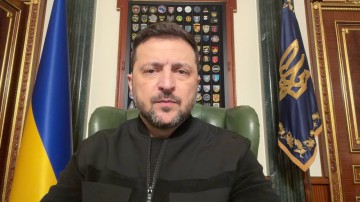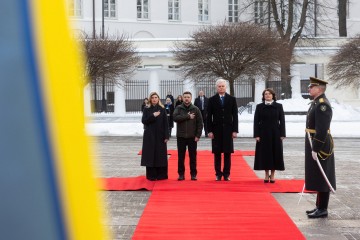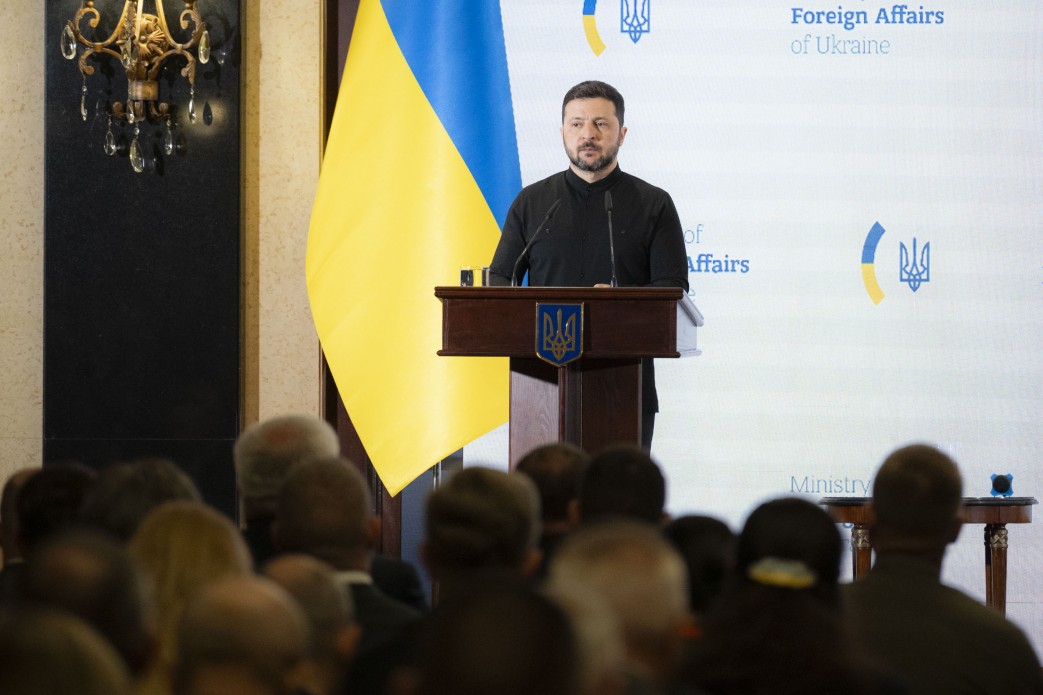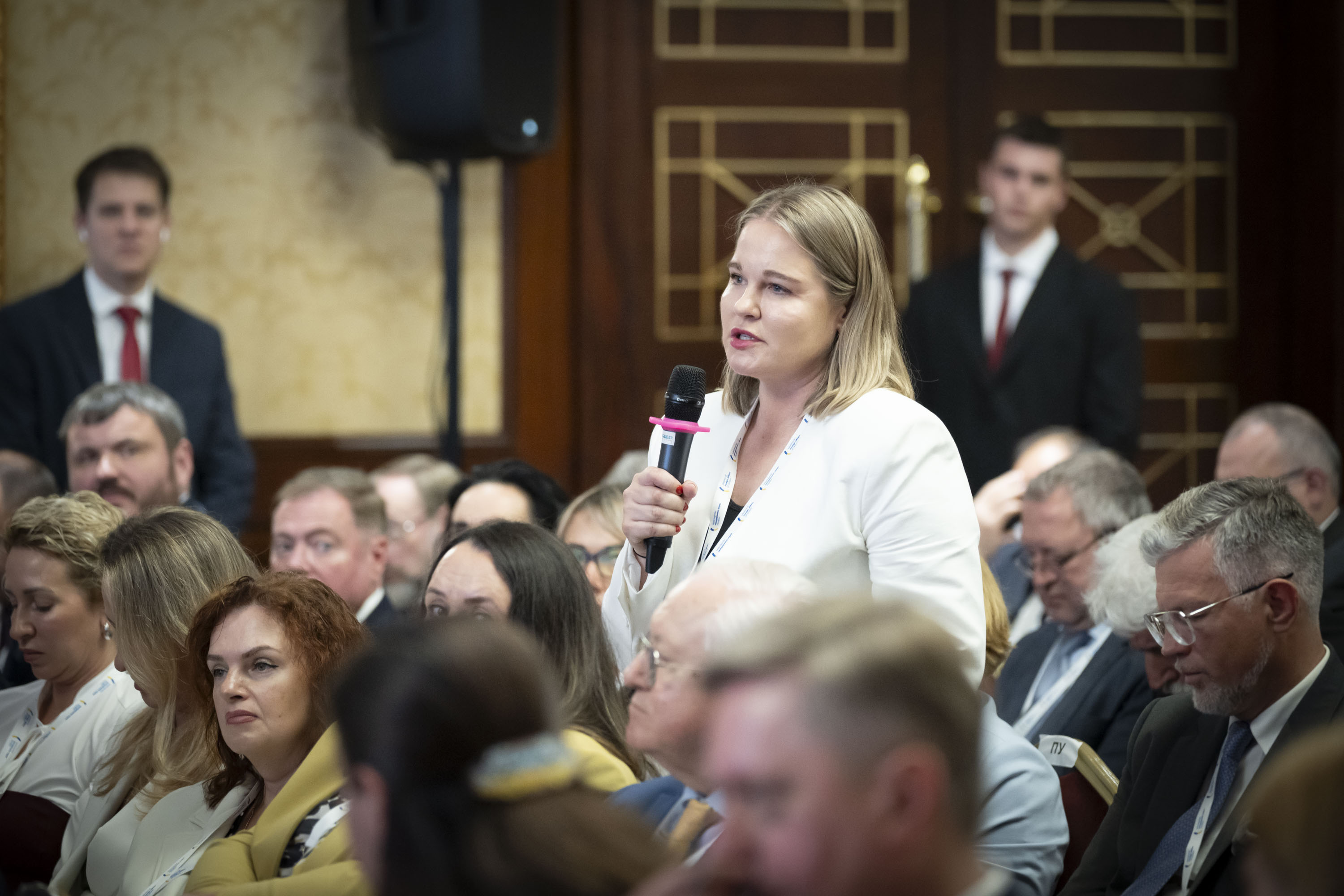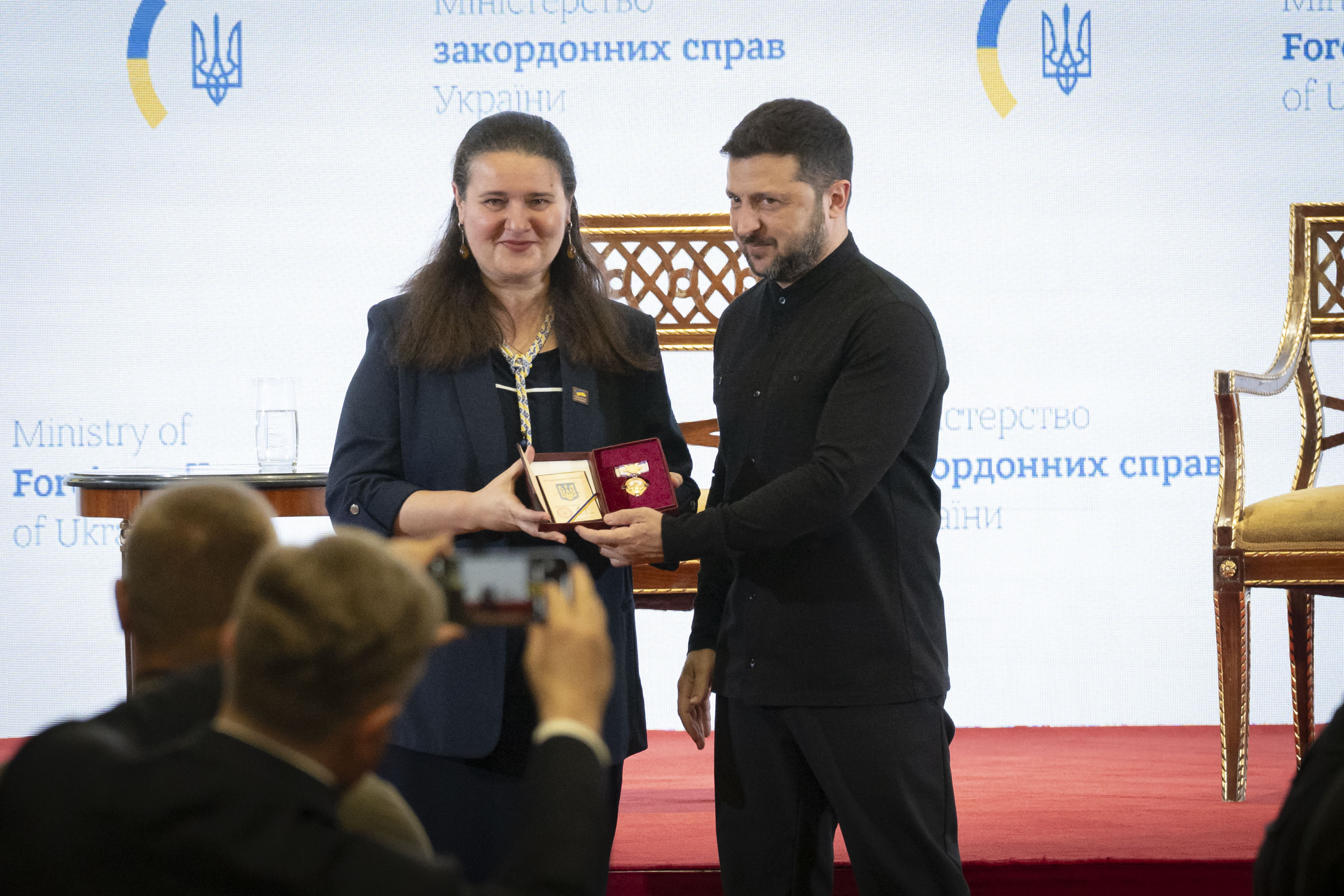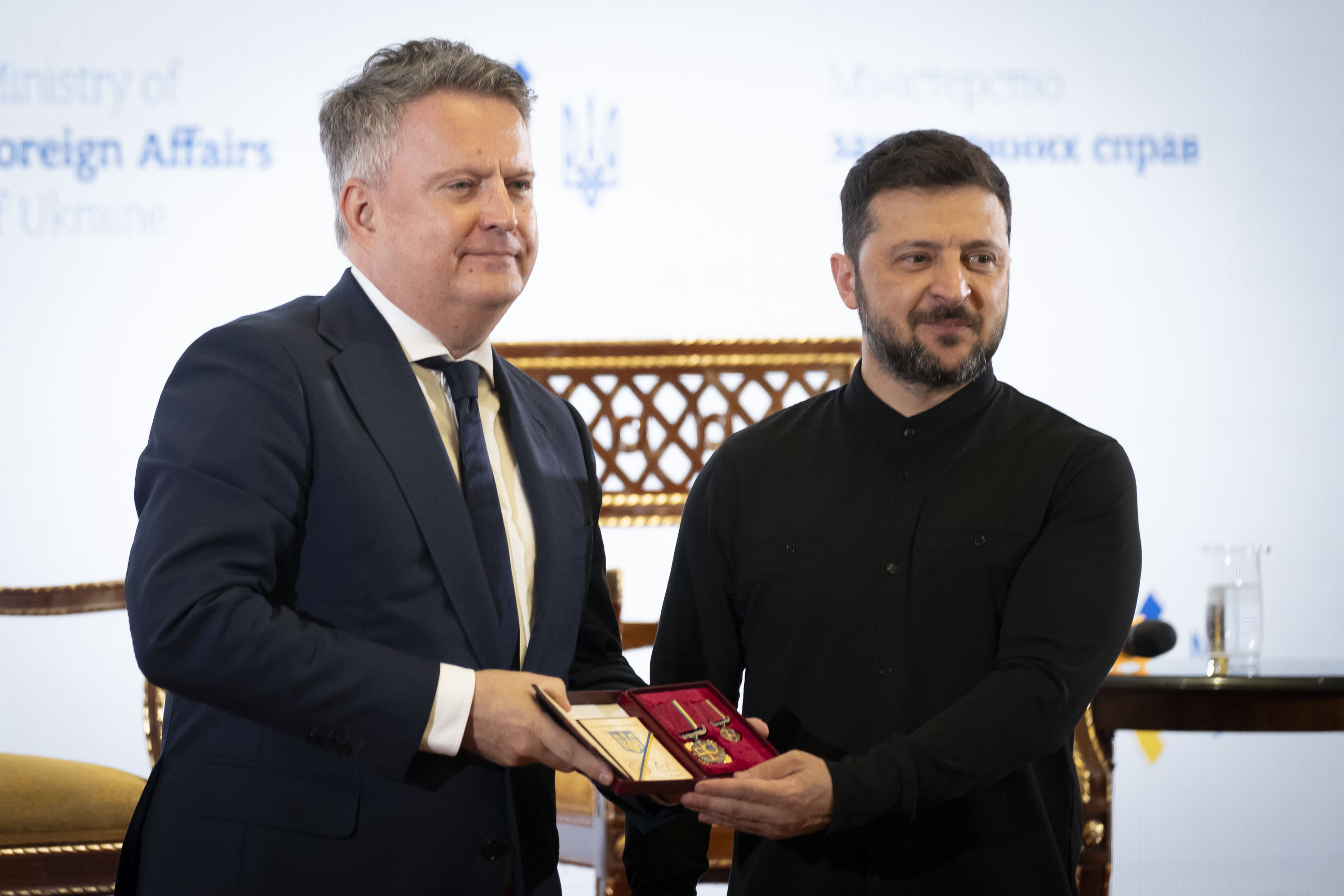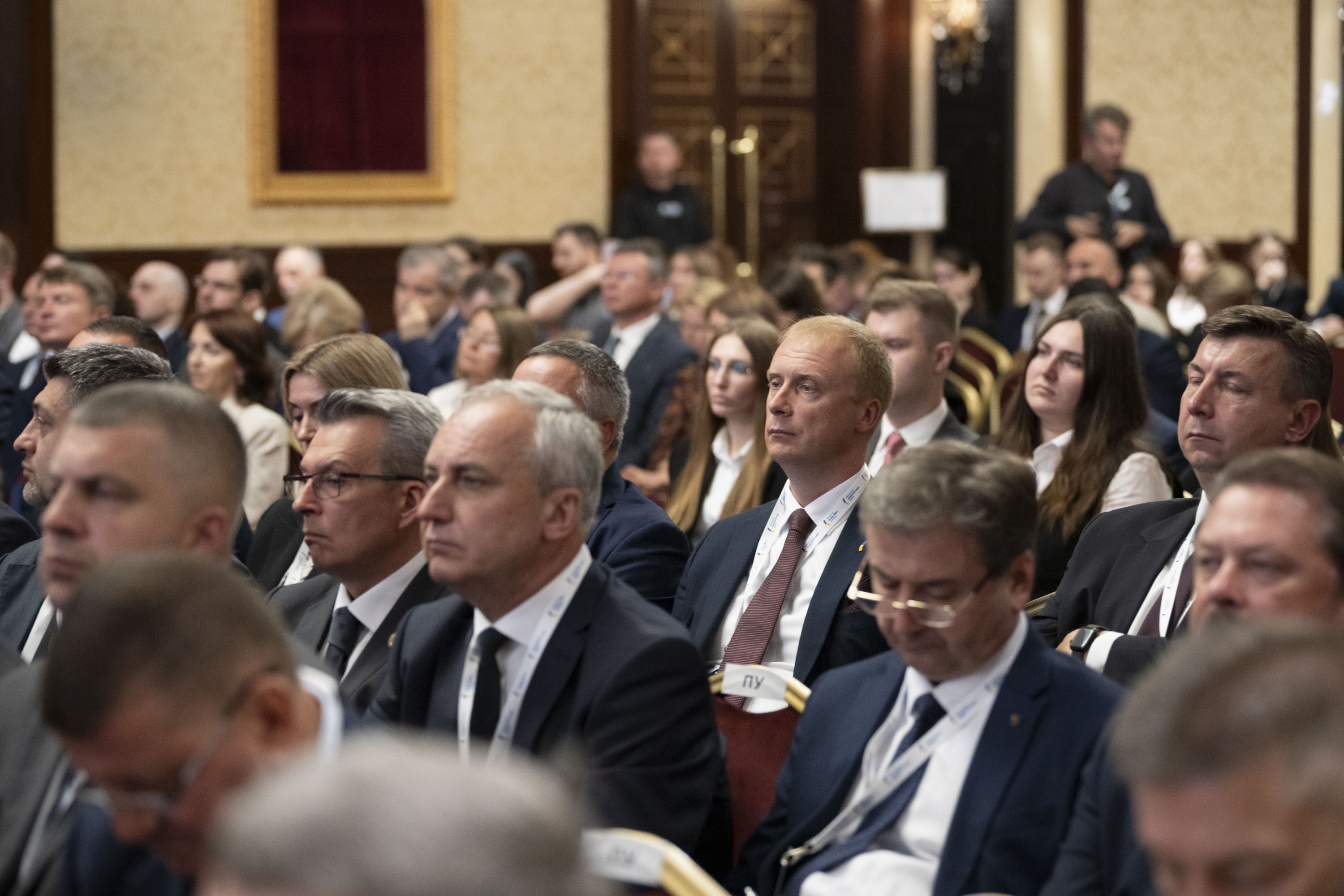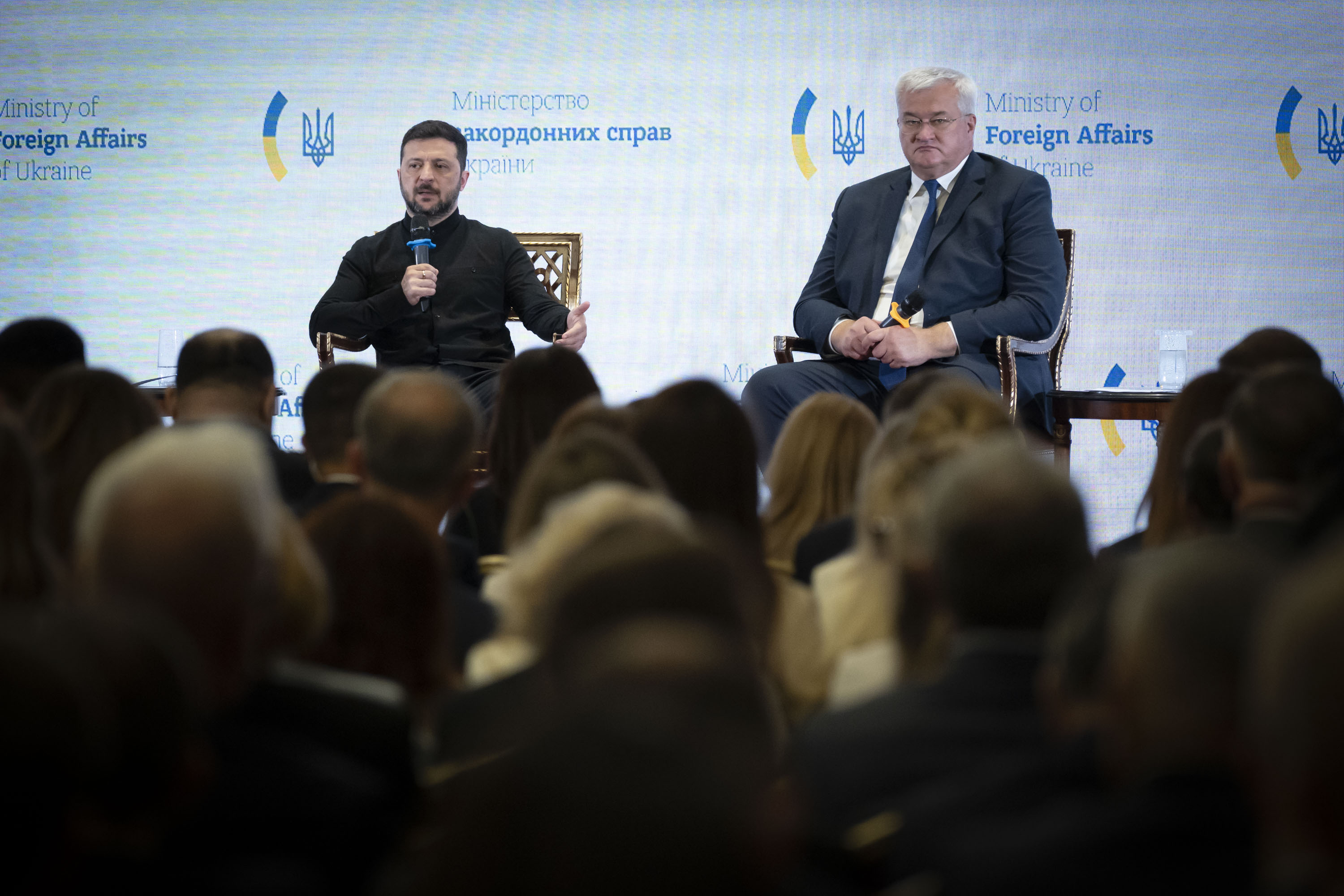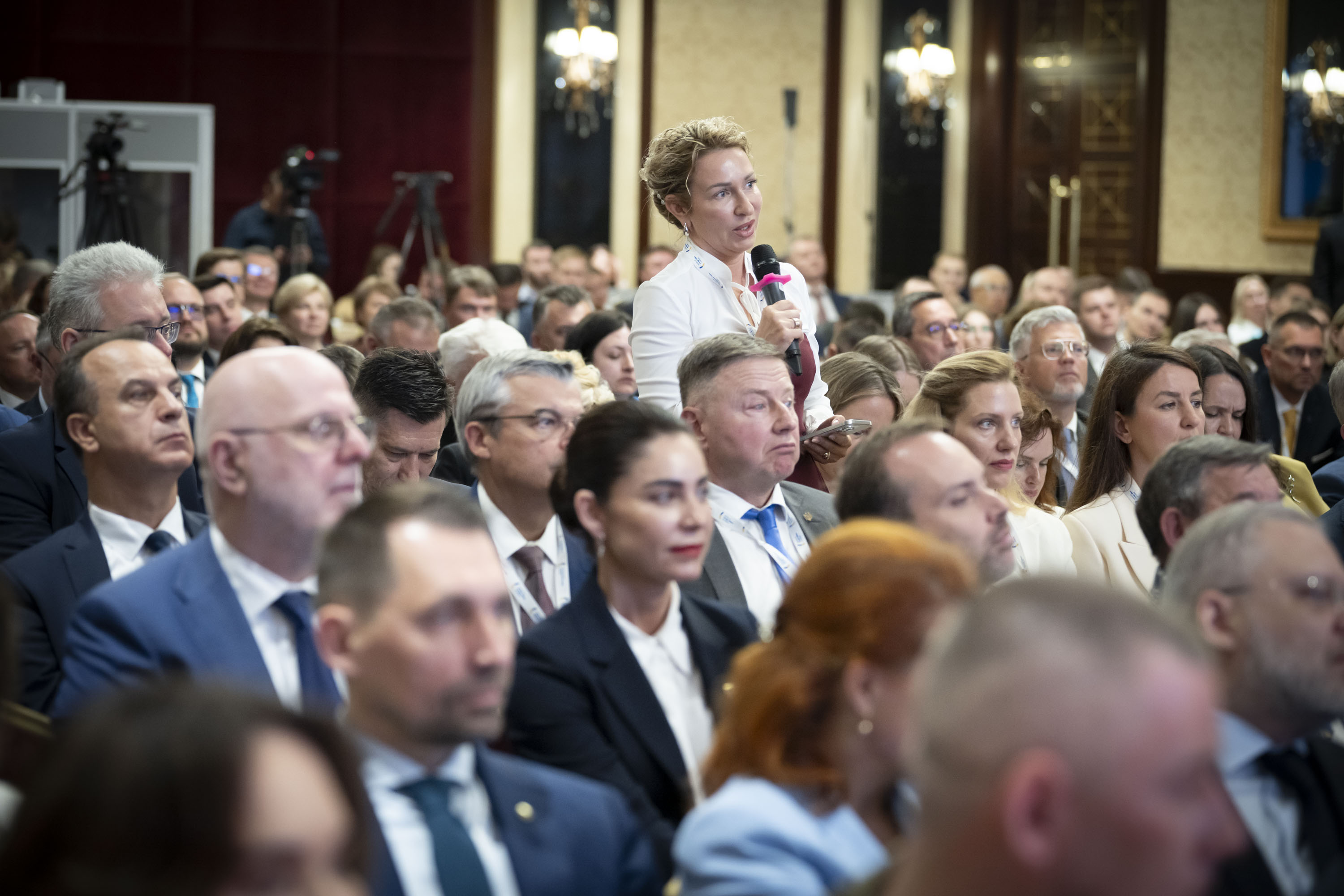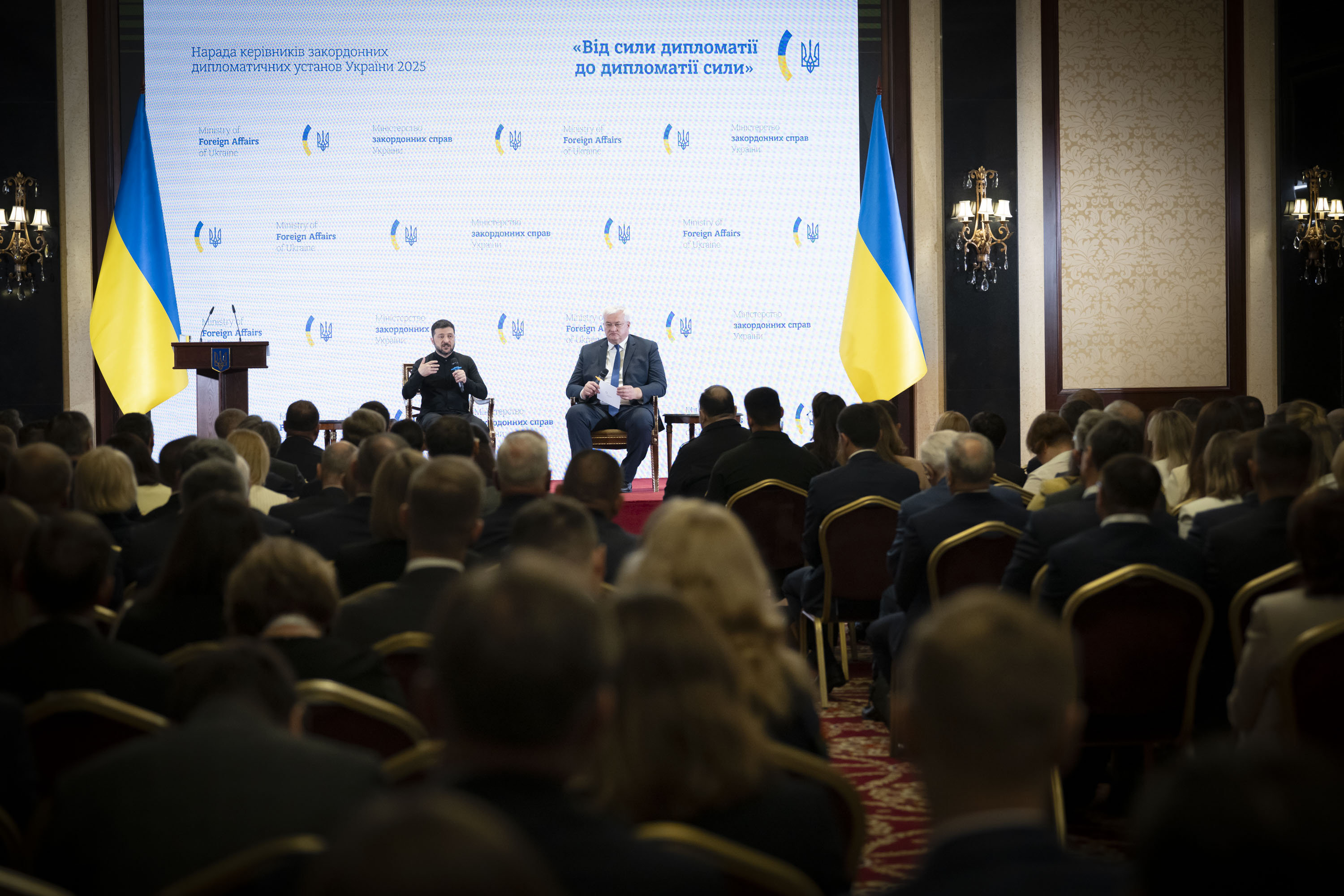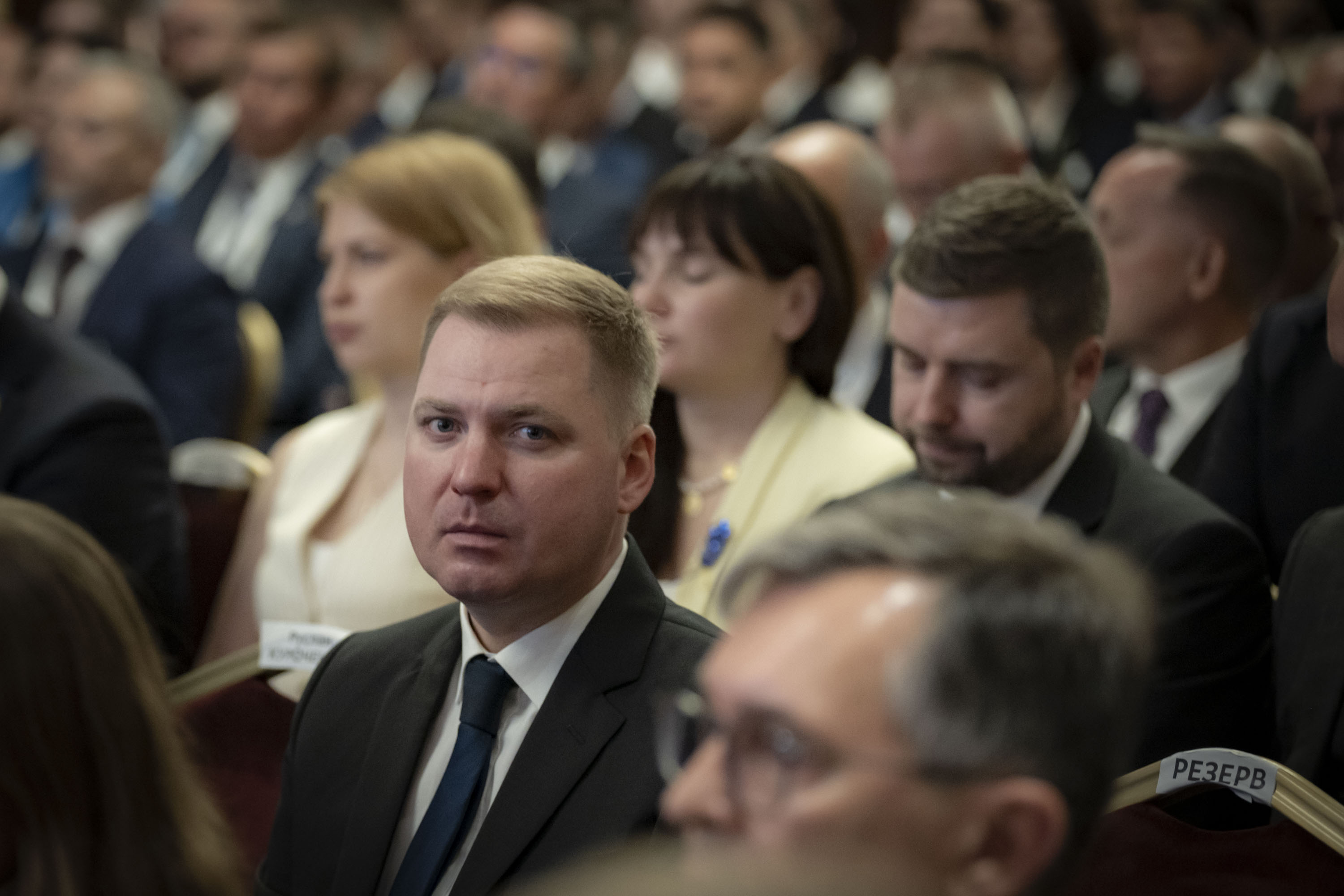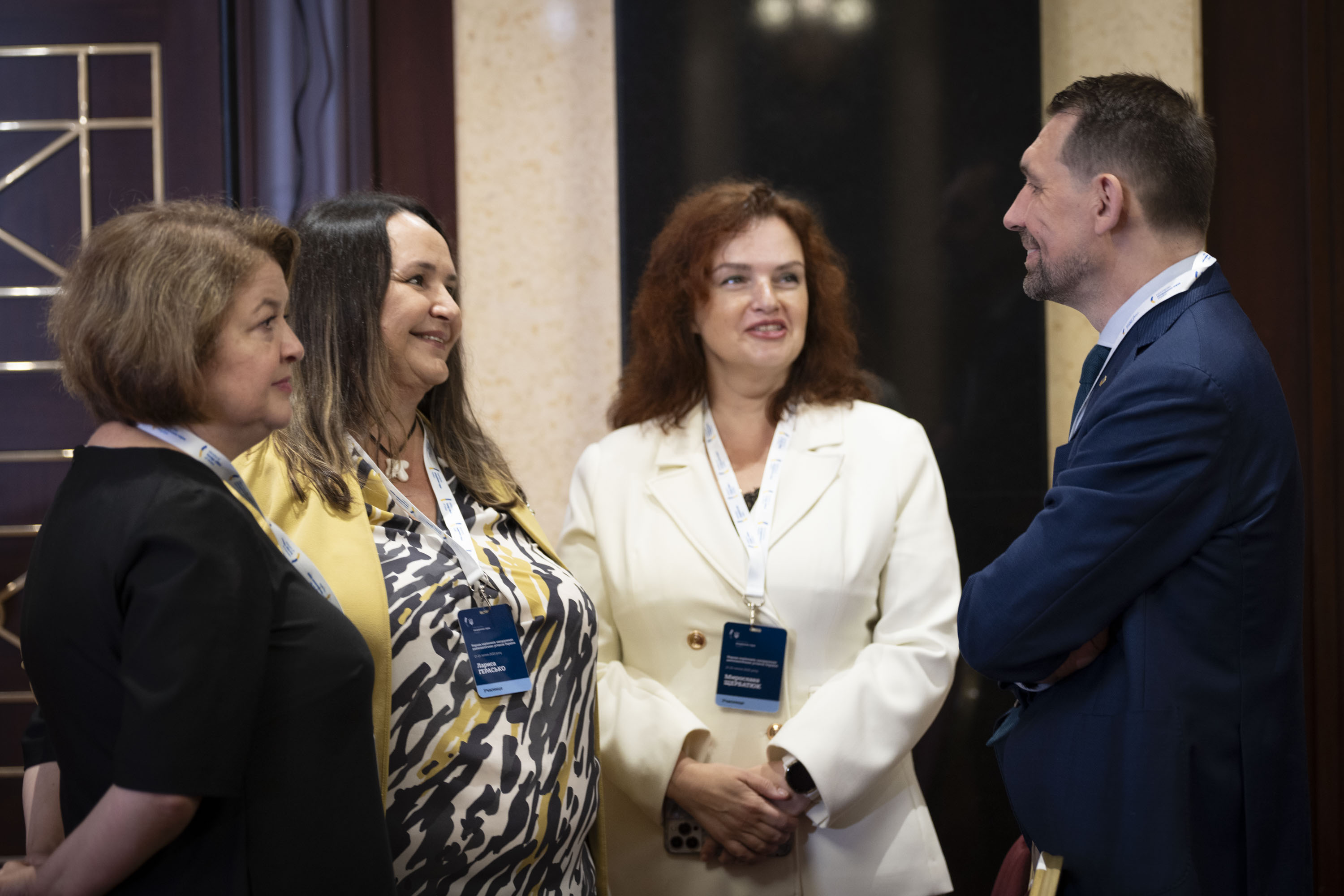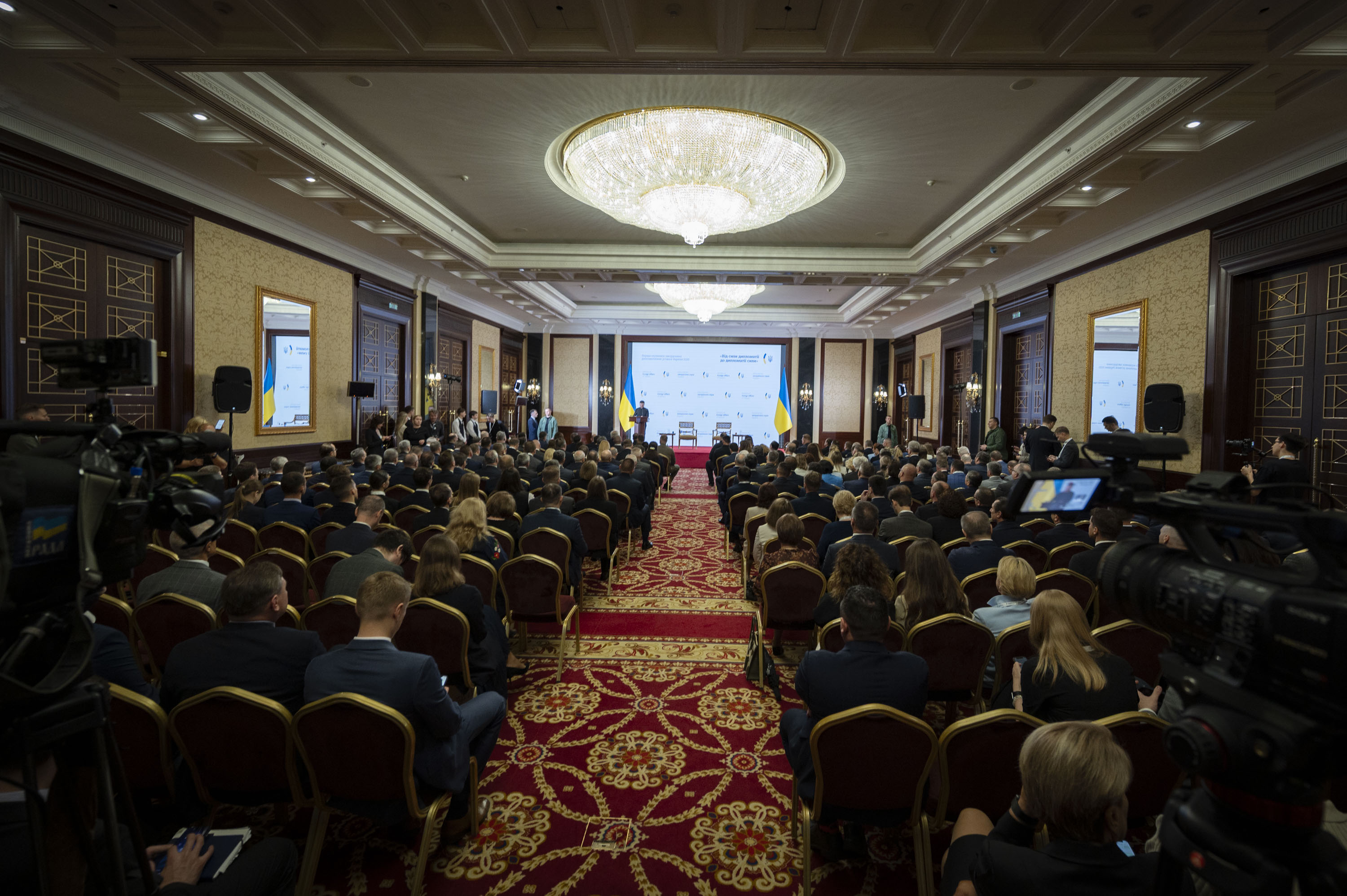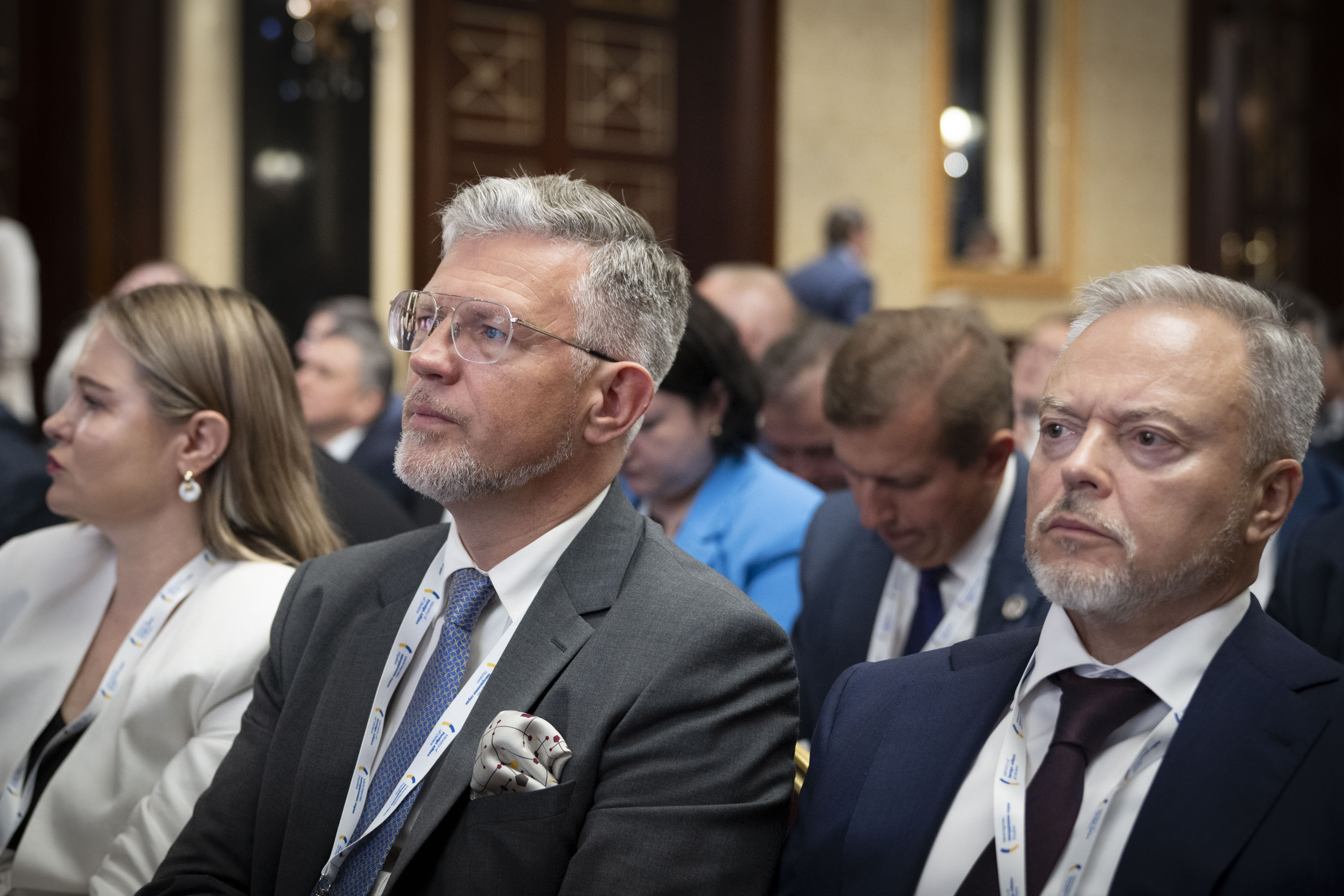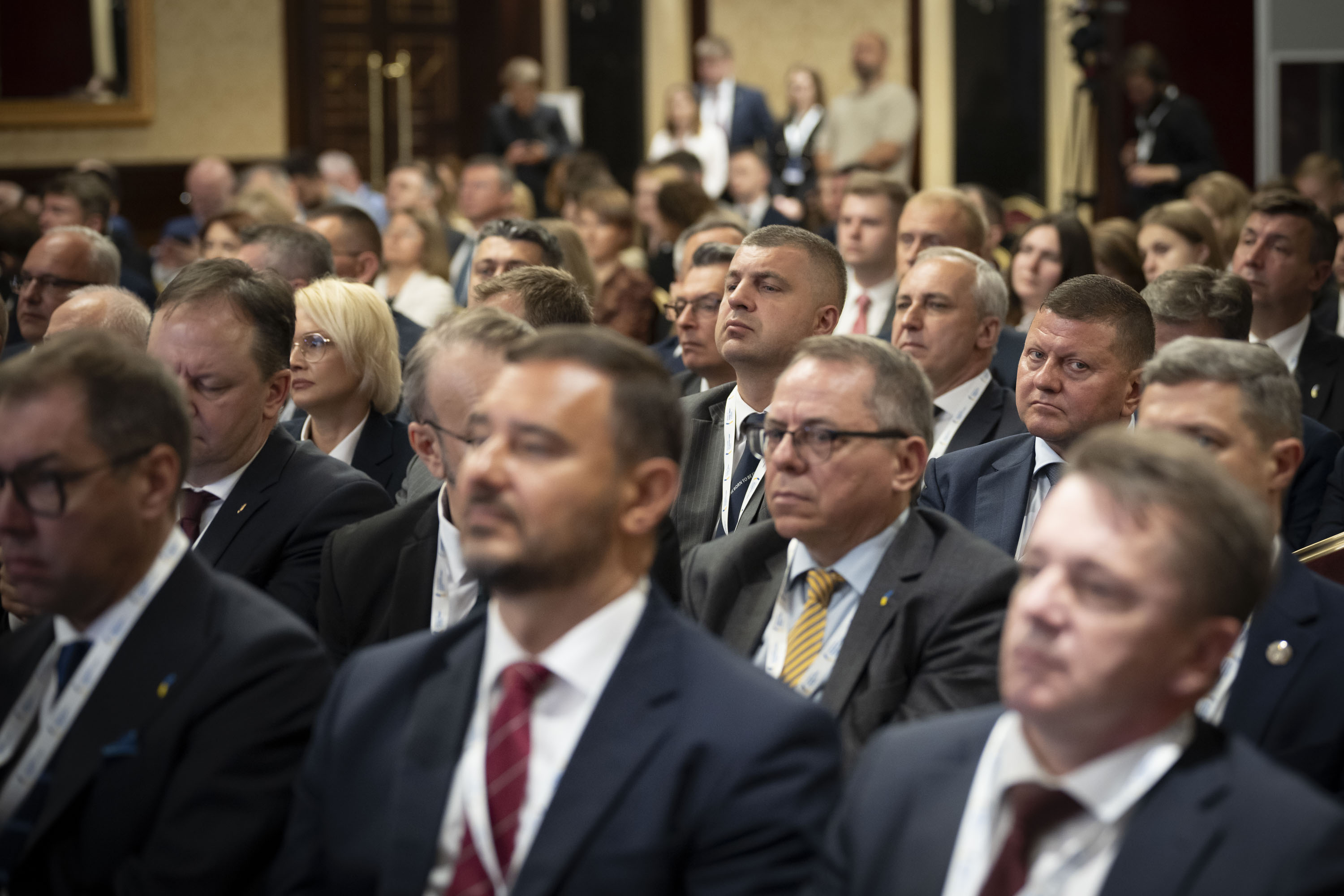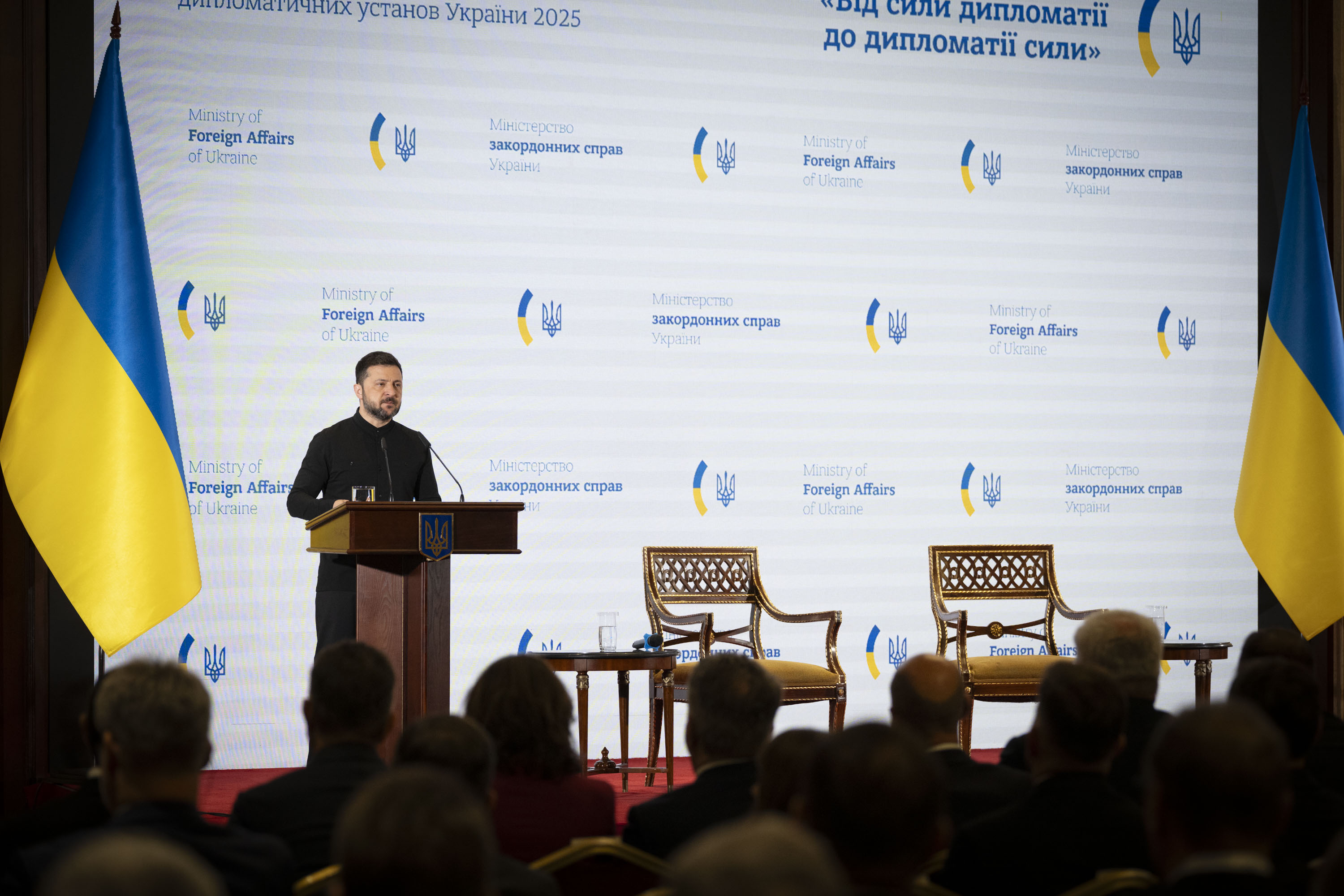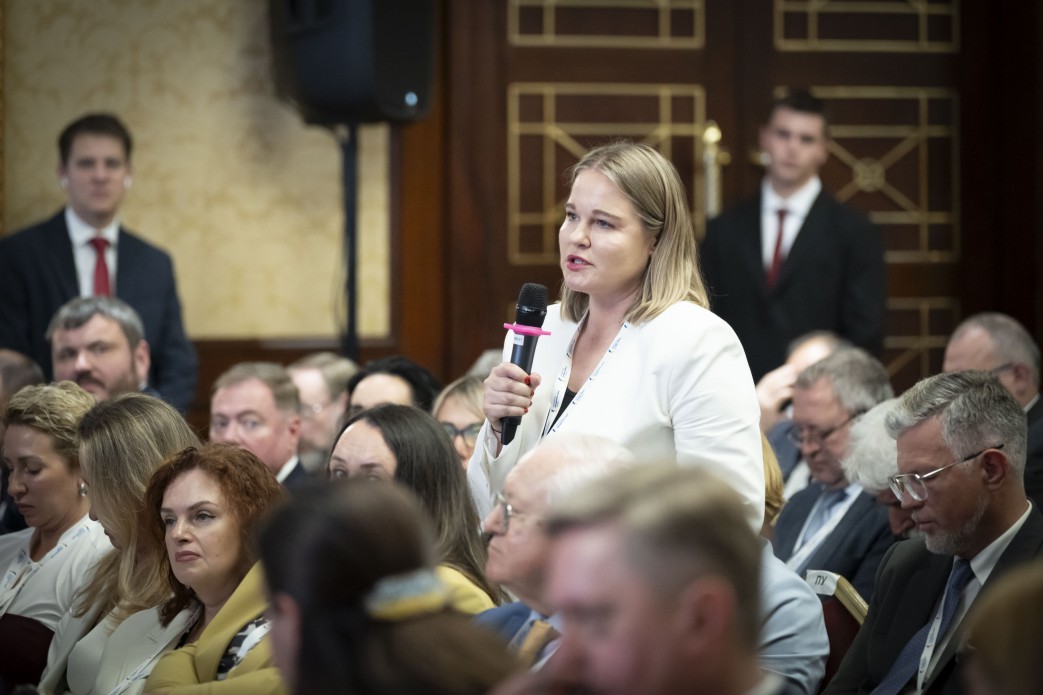Good afternoon!
Welcome, everyone! Glory to Ukraine!
Dear Mr. Minister, esteemed guests! It’s a pleasure to see you.
Mr. Barrot, I thank you for your visit.
Dear Olena Anatoliivna, Mr. Speaker, thank you very much. I’m glad to see everyone. Thank you for being here.
Our dear Ukrainian diplomats!
Almost all of you were in Zaporizhzhia yesterday – you saw what is needed there and what the situation is, which is very difficult, in the frontline regions of our state. Today, Kyiv endured yet another strike by “shaheds” and other enemy weapons, missiles. Other cities and our Ukrainian communities were also targeted – from Kharkiv to Ivano-Frankivsk. Which means you don’t just know what the tasks of modern Ukrainian diplomacy are – you’ve felt them. And those are: even greater efforts to protect the lives of our people, even closer engagement with our partners. The Russians, without doubt, are seeking resources to continue their war – including for this coming year. Much has already been done to limit their resources and much has been done to limit their capabilities, thanks to our warriors, and thanks to diplomacy, to the entire state, and to our people. However, more is still needed. More. The main task of Ukrainian diplomacy is to support everything that protects Ukrainian lives in Ukraine above all and everything that inflicts pain on Russia for this war. And each of you must deliver concrete results for the sake of our people, for the sake of Ukrainians. This is not pathos; this is the truth. I believe this to be the key goal.
First – weapons.
Of course, we won’t publicly discuss the details of each line of effort right now. But each of you knows what capabilities exist in your countries and what opportunities there are for cooperation and joint production. We now have truly global cooperation – the largest ever built for Ukraine. But this does not mean that we can stop expanding activities. We must always seek new formats. There was a time when the Danish model was a breakthrough, indeed, a real breakthrough. Also, the Czech initiative on artillery. Much has been done to develop these models, and also much has been done to develop our national aviation – and, by the way, it’s not just the F-16s, but French Mirage jets are also being used very effectively. We thank the French partnership for this, and we thank President Macron – please convey warm greetings to him from me and from Ukraine. And I thank Mr. Minister. I also want to thank our Ambassador to France. Thank you! I don’t see him; we thank you, Vadym. We must continue to develop everything that adds strength to Ukraine in this very way. Right now, the key focus is drones – all types of drones. We have a significant funding shortage. We have it – that’s a fact. At all levels – both in direct relations with countries and through joint formats, including priority ones like Ramstein and the Coalition of the Willing – we are seeking additional funding everywhere. At the embassy level, this must be supported to the fullest. And you must also be active – politically, through the media, frankly, however you can – on the issue of air defenses for Ukraine. The world must know what is happening because of these despicable Russian strikes and how exactly life can be protected here. This must be the work not only of Kyiv but of all our embassies and all our representatives. Your host countries must hear you and must support you. We need this result.
Second. Russian assets must be used for defense against Russian aggression.
Yesterday, by the way, I received a report by the CEO of NJSC “Naftogaz Ukraine.” Naftogaz has won arbitration cases against Russia and against Gazprom. The total amount currently stands at approximately USD 6.9 billion, which would make a significant difference right now if we could direct such a large sum of money to our defense. We must be creative, and we must be persuasive in turning Ukraine’s already won rulings into concrete reality – into the financial realm. Naftogaz and its legal team are working to collect funds from Russia and affiliated entities. They must be supported in this effort. Please get in touch with the CEO of Naftogaz via the Minister of Foreign Affairs if your country has the relevant capacity to enforce these arbitration decisions. Overall, this should be one of your primary tasks – to advocate for the necessity of Russia fully paying for what it is doing against Ukraine. This notably applies to sanctions as well.
In Ukraine, we have initiated efforts to synchronize sanctions. We enforce our partners’ sanctions within our jurisdiction, and accordingly, Ukrainian sanctions must be extended within our partners’ jurisdictions. I know it’s not easy, but it’s necessary, and it is precisely the responsibility of Ukraine’s Ministry of Foreign Affairs, together with the National Security and Defense Council. I also ask you to pay attention to harmonizing the sanctions imposed by certain partners across the jurisdictions of others. Currently, not all EU sanctions packages have even been synchronized among European countries that are not EU members. This must be fixed, and maximum effort must be put into promoting the strengthening of sanctions against Russia.
Particular emphasis is required on the sanctions track in relations with the United States. Since the change of Administration, the substance of our relations with America has transformed. However, the goal of our cooperation with the United States remains unchanged – we must withstand Russian strikes, and this is important even beyond our region and Europe. The defense of Ukraine provides a stronger foundation for global security and helps prevent any wars, including in the Indo-Pacific region. This connection must be affirmed. I also want to thank our Ambassador, Oksana Markarova, for her work in Washington. Thank you, Oksana, I see you! These were very tough years. Very tough, yet productive: much has been accomplished. Thank you, Oksana! Now, the U.S. direction is led by Olha Stefanishyna. I wish her success. The challenges won’t lessen. We have concrete agreements with the President of the United States regarding air defenses, regarding Ukrainian drones for America, regarding economic cooperation and investments. We must implement all of these. And it’s a challenge – to implement all of these. And the role of the embassy should be significant. We also need to advocate strongly within the G7 to ensure that sanctions and sanction measures are taken also in the U.S., in Europe, in Japan.
The entire legal architecture must also work on holding Russia accountable for this war. Efforts are underway to document and investigate Russian war crimes, including our work at the level of the International Criminal Court and our new agreement to establish a Special Tribunal on Russia’s aggression against Ukraine. I would also like to thank the team for this work. Thank you! Greater clarity and specific timelines are needed, particularly regarding the Tribunal’s establishment. Earlier this morning, Andrii and I discussed this. I have instructed Andrii Sybiha, the Minister, to prepare a concrete list of steps – what must be done and when the Tribunal can be launched. Frankly, I would not want the Ukrainian people to wait decades for this launch.
Next – in addition to our traditional relations in Europe at the level of the European Union and NATO, which are now filled with more substance than at any point since Ukraine’s independence, we have also established several special formats. In particular, these include the Ukraine – Northern Europe format, the Ukraine – Southeast Europe format, the Ukraine – Romania – Moldova format, the Lublin Triangle, our special relationship with Türkiye, and our Crimea Platform. Each of these formats requires an ongoing sense that the work is gaining more substance. There is real potential for this, and I ask you to be more proactive in proposing ideas on how to secure results.
As for the European Union – this year, our Government must ensure full readiness across all negotiations and all negotiation clusters. And it will. I have faith in you. We understand that Ukraine is not responsible for the slowdown in its accession process.
And that is a fact, and for that I would like to thank the team and you personally, dear Ms. Olha Stefanishyna. Thank you for the result! We will continue working with the EU to ensure it delivers on its promises. And this is also part of your responsibilities – for those ambassadors working in the European Union, as well as in countries that have influence on the EU. Anyone who harms Ukraine’s interests and undermines global trust in the EU must face consequences. The European integration agenda, in cooperation with the Ministry of Foreign Affairs, will now be led by Taras Kachka. Congratulations. We know you’re a qualified professional – and we’ll see what comes next. There will also be some other changes regarding the European direction – probably personnel changes. But all that’s a bit later.
NATO remains the strongest and potentially most effective security architecture in Europe and likely in the world. Undoubtedly for all, and we are fully aware of that. At the working level, our integration with NATO continues, and we must also take every available step at the political level. I ask you to continue conveying this position in your engagement with partners – it is NATO that is the guarantee of peace in Europe, the most cost-effective – it’s a fact – the most cost-effective and the most efficient guarantee. Russia talks a lot about NATO’s advance, but it is precisely where NATO has advanced that decades of peace have taken hold, while in places where NATO is slow to act, peace is often scarce. I also ask you not to slow down efforts in implementing our bilateral security agreements. They are important. There is a serious result – 28 such agreements are already in place, and each one must be delivered on, particularly with regard to the financial commitments they contain. We must also be active in other regions of the world, and the foundation of our diplomacy must be economic, where that approach truly works, and value-based, where that approach works. The countries of Africa, Asia, Latin America, the Arab world, and the countries of the Pacific region – as I noted earlier today, Ukraine has and must pursue its interests everywhere: economic, political, and security-related. We must already build our positions strategically – after this war, Ukraine will become a security exporter 100%, and our partners should today already see Ukraine accordingly.
Fourth priority. We need increased momentum in negotiations to end the war. This is a challenging track. And we all understand that truly effective negotiations can only happen at the leaders’ level. Currently, our representatives are preparing at least one more prisoner exchange with Russia – and NSDC Secretary Rustem Umerov has proposed to the Russian side a new meeting of representatives in Türkiye. The agenda is clear for us – the return of prisoners, the return of children abducted by Russia, and preparation for the leaders’ meeting. I ask you to inform the countries of your posting about the necessity of exactly this negotiation approach, of exactly this agenda, and to ensure Ukraine receives the required political support.
And fifth. Our embassies and our consulates must support Ukrainian citizens and Ukrainian communities. Ukrainians have already become a global community. Of course, there are some differences between migration waves and varying needs across different geographies, but the core is the same – we must maintain the connection between Ukraine and all our people. In particular for this purpose, a law on multiple citizenship was recently adopted, and we have begun its implementation. This is both a task and, I believe, a very significant historic achievement. We will gradually determine the countries where the corresponding procedures will be introduced. I planned to start with the countries hosting the largest Ukrainian populations now – primarily Germany, Poland, the Czech Republic, and the Baltic states. Next, there will be the relevant consultations with the Prime Minister of Ukraine, the Minister of Foreign Affairs, and with Mr. Speaker. I believe we will hold all these consultations and have the list of countries ready. Of course, we should also consider Canada and other countries where many Ukrainians live and where Ukraine feels such strong support. This is also an important aspect – which countries have traditionally stood with us, traditionally supported us, and remain warm, very warm to Ukrainians, as well as very warm and important to Ukraine. I ask that you get in direct contact with our Government officials on education, social matters, the economy – everything that our citizens need in your countries of assignment and that can be provided – everything that can be provided must be provided.
Ukraine’s embassies and Ukraine’s consulates must truly function as hubs of action in support of Ukraine. And we also discussed this in detail today with the Minister of Foreign Affairs, and we will demonstrate a new approach regarding consulates in other countries. I thank all of you here today, and I thank each of you who work this very way – for results, for a free, strong, and independent Ukraine.
Glory to Ukraine!


